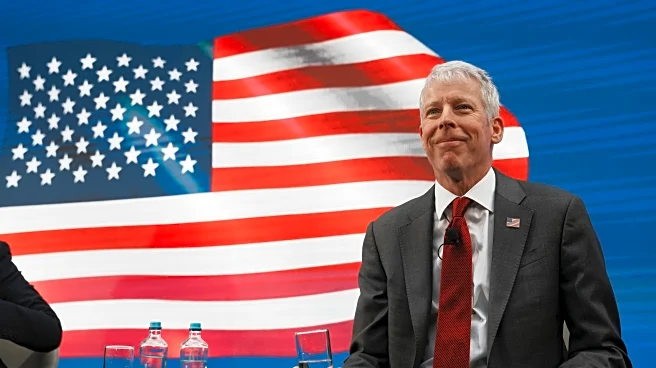ATHENS, Greece (AP) — Senior U.S. officials urged European allies Thursday to speed up the phasing out of Russian gas by expanding regional pipeline networks and boosting American liquefied natural gas imports across Europe.
U.S. Energy Secretary Chris Wright and Interior Secretary Doug Burgum joined over 80 American officials, EU energy ministers and top LNG executives for talks in Greece hosted by the Atlantic Council, the Washington-based think
tank.
“The United States alone could displace all the Russian gas in Europe with what we’re building,” said Burgum, signaling strong U.S. intent to fill the void left by Russian supply cuts.
The push comes as President Donald Trump continues to leverage America’s position as the world’s top LNG exporter, tying energy supply to trade relations with Europe and efforts to end the war in Ukraine.
Burgum also took aim at European climate regulations, claiming they could hold back energy partnerships.
“News flash: There is no energy transition, There’s only energy addition,” he said, arguing that “the regulatory state” in Europe risks keeping the region back from the next wave of energy innovation and the development of energy-hungry artificial intelligence.
With Europe already the largest market for U.S. LNG, focus has shifted to the so-called Vertical Corridor — a new north-south gas route linking Greece to Bulgaria, Romania and Ukraine. Export terminals near Athens and in northern Greece will play a key role.
“Greece is blessed with a very unique geographic location, and we are the natural entry point for American liquefied natural gas into Europe,” Greek Prime Minister Kyriakos Mitsotakis said late Wednesday.
U.S. and European officials said the corridor could be crucial in helping war-torn Ukraine cope with relentless Russian attacks against its energy infrastructure.
Following Russia’s full-scale invasion of Ukraine in 2022, EU members scrambled to modify pipeline networks to replace Russian exports with LNG provided by the U.S. and other major suppliers.
Wright, the U.S. energy secretary, welcomed plans by the European Commission to phase out all Russian gas supplies to the EU over the next two years, saying it will “both starve the Russian war machine and build a growing future relationship” between European nations and the United States.
“They have five pipelines that come to Europe and one pipeline that goes to China,” he said, referring to Russia.
Speaking to The Associated Press on the sidelines of the Athens conference, the CEO of Ukraine’s largest private energy producer warned of severe challenges.
Maxim Timchenko of DTEK described the Athens meeting as “extremely important,” and urged European and American countries to help supply additional gas and equipment to repair Ukraine’s power grid.
“This coming winter will probably be the most difficult winter since full-scale invasion,” Timchenko said. “We need help. We need help in gas supply, we need help in supply for our power generation.”
DTEK inaugurated Ukraine's use of the Vertical Corridor earlier this year, with an LNG shipment from Louisiana to Greece.
Separately Thursday, the U.S. and Greek partners announced further investments in the eastern Mediterranean.
Exxon Mobil, alongside Greece’s Helleniq Energy and Energean, confirmed new exploration plans for oil and gas in the Ionian Sea, part of the U.S. company's broader strategy to expand energy capacity in the region.
___
Volodmyr Yurchuk and Illia Novikov in Kyiv, Ukraine contributed.
















